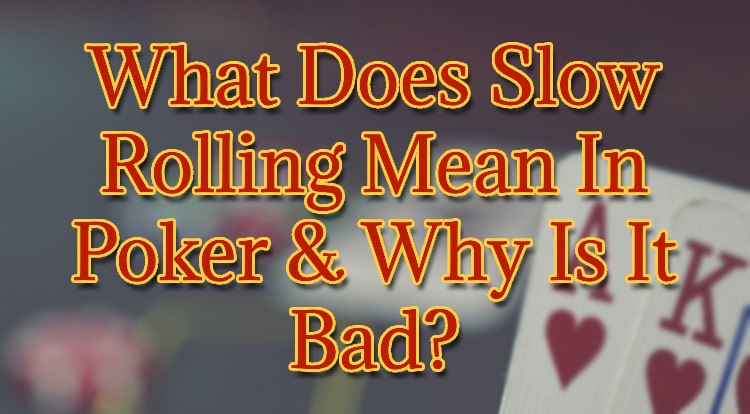
In this blog post for UK Online Slots, we'll delve into the nuanced world of poker, focusing on the concept of slow rolling. We aim to clarify what slow rolling is, distinguish it from slow playing, explore why it's frowned upon, and discuss its legality in the game.
Whether you're new to poker or looking to brush up on your etiquette, this guide can help to ensure you're well-versed in one of the game's more subtle aspects.
What Is Slow Rolling In Poker?
Slow rolling in poker refers to a scenario where a player, holding a winning hand, intentionally delays revealing their cards to give their opponent the false hope of winning. This tactic isn't about strategy; it's about misleading the opponent for a moment longer than necessary.
Unlike strategic plays aimed at maximising potential winnings, slow rolling is seen as unsportsmanlike because it plays on the emotions of others under false pretences. Essentially, it's about pretending to be in a weaker position than you actually are, only to reveal your strength at the last possible moment, often seen as a breach of poker etiquette.
What Is The Difference Between Slow Rolling & Slow Playing?
Slow playing, unlike slow rolling, is a legitimate strategic move in poker where a player with a strong hand deliberately acts weakly. The aim is to keep opponents in the game longer, encouraging them to bet more than they might if they knew the strength of the slow player's hand. This technique is about deception for strategic gain, not emotional manipulation.
In contrast, slow rolling has no strategic value; it's purely about delaying the reveal of a winning hand in the showdown to mislead an opponent into thinking they have a chance of winning.
While slow playing is considered a skilful part of poker strategy, slow rolling is viewed negatively, as it breaches poker etiquette by disrespecting opponents. Essentially, slow playing is a tactical move during the game, while slow rolling occurs at the end of a hand, exploiting the reveal for unnecessary drama.
Why Is Slow Rolling Bad?
Slow rolling is frowned upon in poker because it is seen as a breach of sportsmanship and respect. At its core, poker is not just a game of cards but also one of integrity and mutual respect among players. Slow rolling undermines these principles by needlessly prolonging an opponent's disappointment for personal amusement or ego. It creates unnecessary tension and can sour the atmosphere of the game, affecting not just the target but the overall experience for all participants.
Such behaviour is considered unsportsmanlike because it prioritises gloating over respectful competition, eroding the trust and camaraderie that make poker enjoyable for everyone.
Is It Against The Rules To Slow Roll In Poker?
While slow rolling is not explicitly against the official rules of poker, it is widely considered a violation of the game's unwritten rules of etiquette. Poker etiquette encompasses the moral and behavioural standards expected of players, including respect, sportsmanship, and integrity.
Engaging in slow rolling contradicts these values by disrespecting opponents and diminishing the spirit of fair play. Thus, even though you won't be penalised by the rulebook for slow rolling, doing so can tarnish your reputation among fellow players and is likely to be met with disapproval in any respectful poker setting.
Can You Slow Roll Online?
Yes, you can slow roll in online poker, but it's not always as apparent as in person. Online play introduces variables like connection issues or multitasking that can lead to slow responses, making the intention behind a delayed reveal less clear.
While a slow roll could be interpreted as a technical glitch or distraction, frequent delays at crucial moments might still be seen as poor etiquette by other players. It's essential to maintain the same level of respect and sportsmanship online as you would at a physical table, recognising that the digital environment has its unique challenges and misunderstandings.
Conclusion
In summary, slow rolling in poker - deliberately delaying the reveal of a winning hand to give false hope to an opponent - is considered unsportsmanlike and against poker etiquette, even though it's not against the official rules. It's different from slow playing, a legitimate strategy that involves playing a strong hand weakly to encourage more betting.
We advise players to gamble responsibly and maintain high standards of respect and sportsmanship at the table, honouring the unwritten rules of poker etiquette for a fair and enjoyable game for all.
